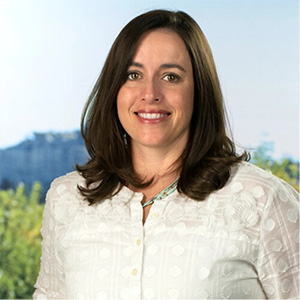Lindsey Mohan

Good education is not what fills your head with facts but what stimulates curiosity. You then learn for the rest of your life.
~— Neil deGrasse Tyson
Bio
Senior Research Scientist
Dr. Lindsey Mohan joined BSCS as a Research Scientist in May 2017. Her expertise is in instructional materials design and earth and environmental science learning.
Prior to joining BSCS, Lindsey served as a faculty member for the Alliance for Catholic Education at the University of Notre Dame. In this role, Lindsey taught courses on science assessment and middle school methods in the Master’s in Education program. She also supervised early career teachers in grades 2-12 in Catholic schools impacting underserved student populations and their families.
Between the time she completed her doctorate studies and returned to educational design work, Lindsey taught middle school earth science in a rural, Title 1 public school in Texas. This experience provided opportunities for Lindsey to put into practice the instructional approaches and strategies she learned about and advocated for throughout her graduate studies. The successes and struggles she experienced as a classroom teacher were transformative in her educational preparation.
Lindsey specializes in student learning and instructional materials design in earth and environmental science. Lindsey has designed resources for teachers, for example, serving as the Climate Education manager at National Geographic Society. This work included developing a series of professional development guides for teachers called the Environmental Literacy Teacher Guides, designing online educator courses in environmental literacy topics, and collaborating with informal science institutions and non-profits on a variety of projects. Prior to her work with National Geographic Society, Lindsey was an integral member of the development team for a carbon cycle learning progression as part of her role with the Environmental Literacy Project at Michigan State University.
In recent years, Lindsey has served as a writer and collaborator on synthesis projects, including Spatial Thinking Concepts and Skills Progression, A Roadmap for 21st Geography Education, Guidelines for Assessing High Quality Instructional Products, and A Synthesis of Math/Science Teacher Leadership Development Programs: Consensus Findings and Recommendations.
Lindsey has a BA in Psychology from the University of Notre Dame, and a PhD in Educational Psychology and Educational Technology from Michigan State University. Her dissertation focused on productive discourse in science classrooms.
When Lindsey isn’t working, she spends her free time in the outdoors hiking, kayaking, and sailing with her husband and twin boys.
Selected Publications
Anderson, A., Gane, B., Hmelo-Silver, C., Moulding, B., Mohan, L., Vo, T. (2019). CCCs as epistemic heuristics to guide student sense-making of phenomena. In Fick, S. J., Nordine, J., & McElhaney, K. W. (Eds.). (2019). Proceedings of the Summit for Examining the Potential for Crosscutting Concepts to Support Three-Dimensional Learning (pp.41-51). Charlottesville, VA: University of Virginia. Retrieved from http://curry.virginia.edu/CCC-Summit.
Mohan, L., (2018). Student learning of place: Learning progressions can help fill the gaps. Journal of Geography, 117(3), 125-127.
Mohan, L., Galosy, J., Miller, B., & Bintz, J. (2017). A synthesis of math and science teacher leadership development: Consensus findings and recommendations. Colorado Springs, CO: BSCS.
Mohan, A., & Mohan, L. (2014). Spatial thinking through the elementary years. Social Studies Review, 52-29.
Mohan, L., Mohan, A., & Uttal, D. (2014). Research on thinking and learning with maps and geospatial technologies. In Solem, M., Huynh, N., Boehm, R (Eds.), GeoProgressions. Learning progressions for maps, geospatial technology, and spatial thinking: A research handbook, (9-21). Association of American Geographers, Washington, DC.
Mohan, L., Chen, J., & Anderson, C.W. (2009). Developing a multi-year K-12 learning progression for carbon cycling in socioecological systems. Journal of Research in Science Teaching. 46(6), 675-698.